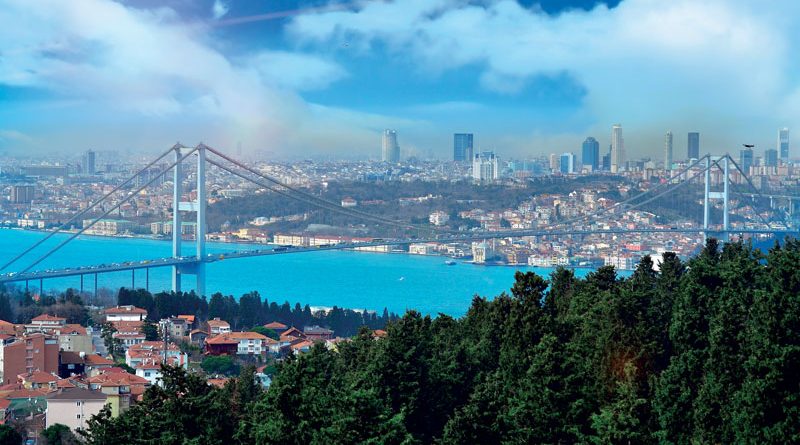Why Invest in Turkey?
Macro-economic data coming out of Turkey confirms that it is one of the most attractive places for foreign investment. Possessing cutting edge technology across various sectors and featuring in the top ten best countries to do business. 2018 saw legislation put in place that will simplify investment procedures, access to finance and tender management.
by Silvia Crespi
Turkey is a G20 economy, 2017 saw it reach 13° place in GDP (under the PPP, Purchasing Power Parity index). Over the years 2003-2017, GDP grew at an average of 5.7%; (2.6%. in 2018). Last year’s figures also show foreign investment growing by 14% on the previous year. Deficit/GDP is back in positive territory after the 2008 recession. As we go to press, the Turkish lira is valued at €0.16. Such data clearly shows Turkey to be a dynamic country with great ability to attract investors. Its population, experiencing strong growth is also very young. Half of Turkish citizens are under 31 years old, this compares very favorably with the EU28 average of 42.9 and Germany at 45.9. By 2027, today’s population of 80 million will be over 90 million, meaning it will be the most populous European country. Education is also experiencing a strong upturn, with its 800.000 graduates each year possessing high level technical and management qualifications.
The economic make up of the country shows rapid expansion among the middle class.
In 2016, 5 million citizens had a high level of salary, over $55K, compared to 1 million in 2002. There has also been great growth in those with middle income, $10K – $25K, now standing at 40 million against 17.8 million in 2002.
Turkey is one of the leading global nations in poverty reduction and it is important to note that national growth strategy has attained a high level of awareness among the population, thanks, in part, to a solid expansion of English proficiency.
A major market, that is still growing
Turkey has 20 cities whose population is over 1 million, and Istanbul with 15 million residents is Europe’s largest city. The country possesses cutting edge technology in various sectors with aeronautics figuring among these. Turkey is one of the few countries in the world able design, develop, assemble, test and support airplanes and helicopters.
The country enjoys trade relations around the world, including the Gulf states. Its relationship with Italian industry is now well founded.
1.435 Italian companies have invested over $5 bn in blue chip areas like electrical appliances, for example Indesit and Candy; agricultural machinery, CNH and SAME; food industries, Ferrero and Barilla; automotive, FCA and Pirelli and banks such as Unicredit and Intesa Sanpaolo. Last year, Italy was the third highest investing country in Turkey with $507 mn of incoming capital. This represents 8% of total foreign investment, which grew by 14% on 2017. Exports are also up reaching a value of $157 bn in 2017. Germany is its biggest importer, standing at 9.6% of total exports followed by the UK and the UAE. Italy is Turkey’s fifth biggest trading partner with deals totaling €16bn, €8.5.bn worth of exports from Italy with the SACE financial index foreseeing further growth of around €3bn over the next three years.
Furthermore, thanks to its geographical position, it can be considered a genuine hub. In 4 hours, it is possible to reach 76 countries. The new Istanbul airport (Istanbul Great Airport) is the biggest in the world and adds further clout to the already potent Turkish Airlines organization which connects 306 passenger destinations and 83 cargo destinations.
A dynamic country with great attraction for investors
According to the World Bank, Turkey is in the top ten best countries in which to do business. The reasons are manifold: the hourly cost of labor in the manufacturing sector, not forgetting (see figure…); management and qualified technical team salaries (see figure..). Industrial costs are more than competitive, with electricity and gas in particular enjoying the lowest prices in Europe.
On a political level, effective reform is underway. 2018 saw legislation in place that would simplify investment procedure: an organic reform to improve the overall investment eco-system.
There are many international brands having their R&D centers in Turkey. It is worth noting the country is Europe’s largest producer of electrical appliances, but is also at the peak of global production in other areas: The CAGR (Compound Annual Growth Rate) index, which concerns the measurement of growth of a specific good over a specific period of time
(i.e. investment, revenues…), provides the following average data for the last ten years: 12.9% for agriculture; 10.2% for construction; 7.6% for food and beverage and 6.9% for metals and non- metals.
Turkey is Europe’s second biggest plastics producer and one of the main markets for fiber textiles.
It is the world’s ninth biggest steel producer and seventh for agricultural machinery production.
Food and beverage (value €70bn) is the country’s most important economic sector. It manufactures more than 1.700.000 vehicles a year, 78% of which are exported.
Finally, construction is in constant growth, thanks to the 750.000 new homes built every year.
Focus on the most important industrial sectors
Turkey is particularly strong in mechanical working thanks to certain key sectors within the Turkish economy such as automotive, electrical appliances, aerospace and health care. Laser technology is widely produced along with press and forging machinery,
80% of which is exported.
The value of these goods has remained stable ($650M) over the last ten years while export markets have become increasingly diversified (USA, Canada, Mexico, Brazil and India).
Turkey manufactures 30% of total European agricultural machinery with 75% of this demand coming from local players. 70% of imports in the sector concerns tractors and “premium” machinery.
The country is the world’s third largest construction market (after China and India) and ninth in Europe for its production base with over 240.000 employees.
There is a healthy mix of national and international groups present (40% local production, 60% import).
Strong internal demand is driven by public infrastructure and urbanization programs. Access to international markets is guaranteed by the fact that 46 Turkish companies are registered on the “ENR” database of the 250 best contractors around the world.
There is also a solid industrial base in the pump and compressor market, again enjoying strong local demand.
Many companies are SMEs with great potential for growth (over 9.000 employees in 500 companies).

